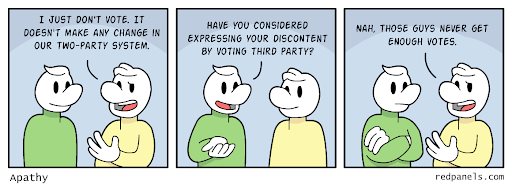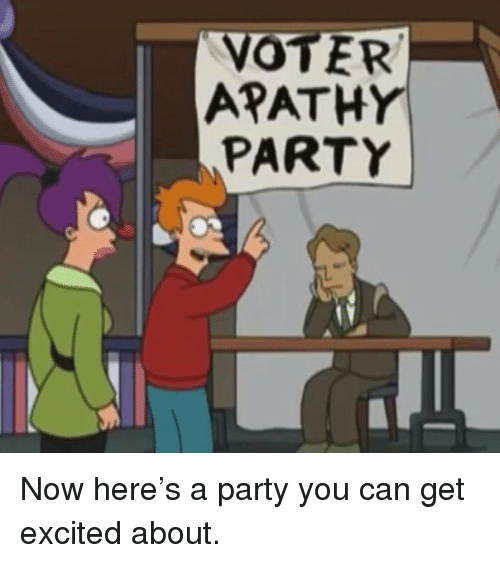Part 2 – Engaging and Disengaging
When this post goes live, Pennsylvanians registered as Democrats and Republicans will have a little over a week to apply for a mail-in ballot (which you can do online [1]), and about two weeks to mail it back (it must be received by 8PM on June 2). As usual, there are two diametrically-opposed groups in the electorate, but things seem to be more extreme than ever. I am not talking about the left and the right; I am talking about the engaged and the apathetic. And for the first time in my life, I find myself in the latter group.
Primaries typically have low voter turnout as compared to general elections, even without COVID-19 keeping people indoors. As I mentioned last week, while I am usually pretty enthusiastic about elections (even the local ones), my desire to vote this time has waned upon researching my ballot.
Enthusiasm Lacking?
I have long been adamantly opposed to the “lesser of two evils” mentality, as many of my friends will remember from four years ago when I vocally supported the Johnson/Weld ticket. I don’t know how we should go about fixing our two-party system, but I do know that something is inherently wrong with it if we regularly wind up choosing between two people we don’t like to lead our country. It’s depressing and demoralizing, and it’s no wonder many people don’t participate in their hard-earned right to democratic elections.
While I’m less than enthusiastic about the election, I have been looking forward to writing this post for a while. Back around the time of the Iowa caucuses, a very liberal and very close friend of mine sent me some articles to read during during my long train rides in Japan. On the way from Aomori to Nagano, I learned about a new theory of predicting election results, in which there is basically no such thing as a swing vote. This theory by Rachel Bitecofer, political science professor at Christopher Newport University, states that people do not fundamentally change how they vote; what changes is who goes to the polls. “Turnout is everything,” she says.[2]

Image credit: [3]
Keep in mind that this article is from the pre-COVID-19 world, so it is likely that some things related to her prediction may have changed, but the theory remains: it is not the votes that shift; it is the pool of voters. Given that, she could still be correct that the Trump playbook for 2020 includes “trying to sow chaos in the Democratic ranks so that supporters of a losing primary candidate either stay home or support a third-party candidate.”
As Bitecofer’s theory goes, I suppose I do fall into the classic “swing voter” category (the thing she asserts does not exist on a large scale): I vote in every election, and I vote for a candidate’s position on issues, not party affiliation… and I’m fairly sure that behavior is not typical. Although my existence flies in the face of her theory, I am feeling demoralized and unmotivated, in part because the candidate who was going to get my enthusiastic vote (but let’s be honest – he still will) suspended his campaign in March.
I’m sure that if I’m feeling disheartened, other people are too. But I will declare here and now: if there’s a possibility that anyone’s campaign is riding on me feeling frustrated and deciding to stay home, I’m not going to let that happen.
Of course, she’s talking about the general election, not the primaries. It will make no difference to our president whether I vote in the primary or not: he’s already secured the delegates he needs to be the GOP nominee (to date winning all but one, which went to Bill Weld). However, I believe that discounting primaries and local elections is where the damage starts. Skipping one election because you don’t believe your vote will matter makes it easier to skip another. It’s very much like running a marathon – you have to lace up your shoes and get out the door whether you want to or not. The more excuses you make, the more times you skip a training run, the harder you make it for yourself on the big day. (Believe me, I know.)
Enthusiasm Overblown?
On the other hand, I know several Democrats who are still charged up and still plan to vote for Bernie, even though he is no longer in the race. Many of the ones I’ve spoken with personally are doing so less as an angry “you can’t make me change” protest vote and more to send a message to Biden that he needs to swing left to better represent the party. I understand that there’s a spectrum there, but one end appears to be more thoughtful than the other.

Everyone has hopes and fears of how government decisions will impact their lives, and news networks on both sides of the aisle play on those emotions – the fears especially. Unfortunately that approach does nothing to help foster constructive dialogue about how we can move forward together.
Image credit: [4]
Giving up Facebook for Lent this year made for a very peaceful break from politics. Upon my return, I saw that many of my Facebook friends were still angrily and vocally supporting one B or the other: sharing tweets, memes, and opinion pieces to support their own entrenched positions. And that brings me back to the travel reading/listening material the helped shape this blog post, specifically an episode of Hidden Brain in which guest Eitan Hersh, political science professor at Tufts University, talks about the dangers of “political hobbyism.”
According to Hersh, Americans are now more informed and less involved than ever. Following politics in the US has become very much like following a sports team: you’re happy when your team wins, you’re sad when they lose, you can recite all the stats, and you inherently dislike supporters of the opposing team. However, engaging in politics this way gives you as much power over the political arena as you have in affecting the Steelers’ success when watching the Superbowl.
Network news sources are more likely to appeal to our emotions than to provide actionable information. This emotional engagement cranks us up but doesn’t tell us what we can do about an issue or how we can become engaged to create change. The 24-hour news cycle reinforces our desire for sensationalism, not substance. We crave outrage and gossip; we avoid local news because it’s boring, not alluring; and the cycle reinforces itself.
This addiction we have is concerning to me, and I believe it will only get worse as we move into the general election season. It is especially easy to post an article without reading past the headline, to share a meme that elicits an emotional response but isn’t based on fact, to get into an argument with someone and only see the position, not the person. The Hidden Brain interview with Hersh addresses what the goal should be in our political interactions if we truly want to make an impact: shifting our mentality from simply hating and wanting to defeat the other side, to trying to engage and understand the other side.

Even if my enthusiasm doesn’t return before June 2, that’s not going to keep me from educating myself on the issues at stake and voting.
Image credit: [5]
Making Real Change
Hersh explains that politics isn’t just something that politicians do, but that getting involved locally and making changes, educating yourself and applying pressure in the right places – that’s politics too. We need to look at political involvement as something more than just voting and something different than shouting from an internet soapbox (says the woman with the blog). Interacting with social media, particularly during election season, the question we should be asking ourselves is “how do we re-frame politics from a form of entertainment to a vehicle for change in our lives?”
Lecturing the internet void and engaging in online arguments is probably the least-effective method of changing someone’s opinion, though it can certainly be the most appealing. Probably the most effective method is what Hersh refers to as “deep canvassing,” which involves making deep connections with others through engaging in vulnerable conversations. It is hard, and it is time-consuming, but it’s something I try to do with my closest friends and family members when we disagree on a topic. They may not change my mind, and I may not change theirs, but we retain our mutual love and respect – and better understand all of the factors at play in whatever topic is under discussion.
Ultimately Hersh explains that your country doesn’t need you as an individual; your community needs you, as an individual, to be involved and engaged, to connect with other residents and bridge the gaps that media labeling has created.[6] And that is a great reminder of why, if you can, you should be voting in this primary – because you can make a difference in your local elections.
And that’s where I will leave it for now, knowing that it’s going to be a long five months ahead of us. For my part, I will work to remember that my opinions on various topics may be more usefully applied in some ways than others. I will also do my best to remember that the person on the other side of any argument is first and foremost a person, one who also has hopes, fears, and thoughts about what is best for our country, and who wants to feel heard.
In case you missed it last week (and you’re a registered Republican in Pennsylvania), click below for my primary election guide:
What do you think about these voter engagement theories? Is there anything you plan to do to get more involved – or differently-involved – ahead of the November election? I’d love to hear stories about meaningful, eye-opening conversations you’ve had with someone who had a different opinion.
Thank you for reading!
[1] https://www.pavoterservices.pa.gov/OnlineAbsenteeApplication/#/OnlineAbsenteeBegin
[2] https://www.politico.com/news/magazine/2020/02/06/rachel-bitecofer-profile-election-forecasting-new-theory-108944
[4] https://www.nytimes.com/2020/02/19/opinion/trump-anger-fear.html
[5] https://me.me/i/oter-apathy-party-now-here%E2%80%99s-a-party-you-can-get-8927180
[6] https://www.npr.org/2020/02/10/804612601/passion-isnt-enough-the-rise-of-political-hobbyism-in-the-united-states
0 Comments